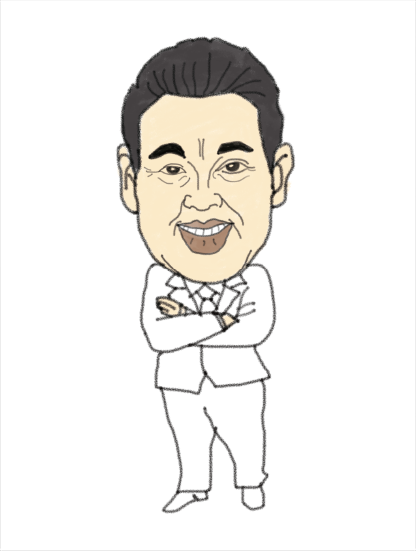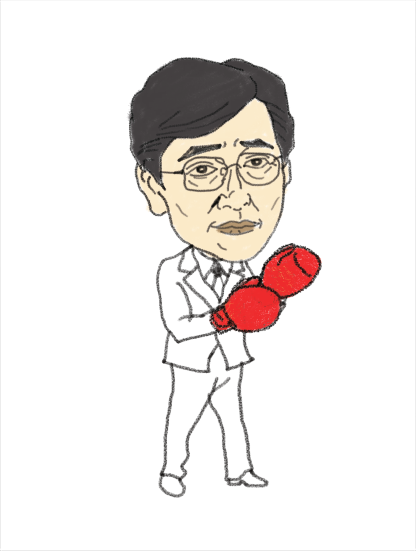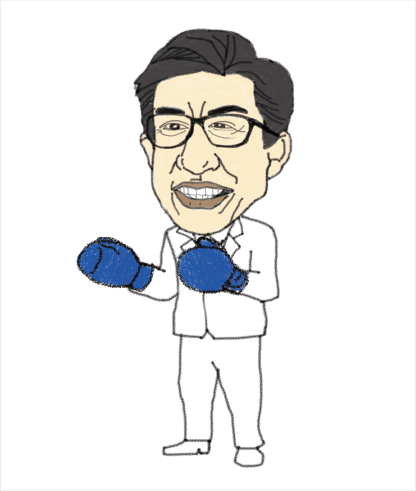Political entertainment programs are the hottest television content nowadays.
In the past, politics were mostly the stuff of current affairs and cultural programs
like the news, “talking heads” shows and investigative documentaries.
But a new format that takes its cues from entertainment talk shows combining
both expert commentary and humor has taken their place, enjoying high ratings.

Political entertainment shows on cable TV networks are causing a sensation. Their high ratings are in part attributable to recent events such as the presidential impeachment grabbing people’s attention, but another reason behind their success is the distinctive approach these new programs are taking.
Two characteristics are commonly found in political entertainment shows. The make-up of the panel — politicians, pundits, lawyers and other political experts — is not different from conventional political shows that used to dominate current affairs programs. What is different is that the shows’ hosts are not news anchors or commentators who exude gravitas, but entertainment celebrities.
But while the combination of expert panels and entertainers may be considered a superficial variation, the more fundamental change is the way they discuss politics on the new shows. The new genre still deals with current affairs but the panel does not just engage in heated but often boring debates; instead, a dash of humor is added to the recipe.
The Munhwa Broadcasting Corporation’s “100 Minute Debate” with journalist Sohn Suk-hee, known for his rigorous anchoring style, aired on terrestrial TV from 2002 to 2009. It followed the then common debate rules to the letter, and that was the key to its success. “Ultimate Debate Battle,” hosted by anchorwoman Baik Ji-yeon on cable network tvN, began airing in 2008 and was more casual than MBC’s “100 Minute Debate,” but it still stayed largely within the boundaries of conventional current affairs programs.

Changing Formats
Contemporary political entertainment shows have an altogether different format. The debates do not follow strict rules but put more emphasis on a natural flow of conversations. Although debates may get intense, there is always room for playful banter and a back and forth of witty jokes, or for using some random non sequiturs to comedic effect. The viewers’ attitudes have changed, too: No longer do they simply expect plain facts and impartiality from the programs. Instead, viewers enjoy learning about current affairs from persuasive speakers whose views correspond with their own. That is why the personal styles and chemistry of the panel are so important.
Take the conservative lawyer Jun Won-tchack, for example, who until recently appeared on JTBC’s “Ssulzun” (“Battle of the Tongues”). Progressives regularly slammed his right-wing perspective on many issues, but he would smooth ruffled feathers with his personality and humor. The other panelist who is still on the show is Rhyu Si-min, a prominent progressive politician and former journalist. Rhyu voiced his opinions on all issues but did not engage in pungent debates with Jun who usually held opposite views. Instead, the two preferred engaging in a two-man comedy routine, much to the enjoyment of their audience. Channel A’s “Outsiders,” another talk show about current affairs featuring former National Assembly members Chun Yu-ok and Chung Bong-ju, follows the same format.
The silver-tongued panelists, regardless of their political leanings, contribute greatly to the popularity of the political entertainment genre. Their expert knowledge of current affairs helps to raise awareness of important issues, allowing people to chuckle about them at the same time.

Changing Media Landscape
Amid the changing media landscape, cable TV networks’ newly launched political entertainment shows are now competing with one another. In 2011, two major developments in the Korean media market paved the way for the new genre. One was the introduction and rapidly growing popularity of political podcasts, including “Naneun Ggomsuda” (“I Am a Weasel”), notorious for lampooning then president Lee Myung-bak; the other was the launch of new cable TV networks, made possible by an amendment of the nation’s media law to deregulate the media market, which led to the mushrooming of cable TV networks operated by newspaper companies.
At the time, podcasts were quite new in Korea, and the popularity of “Naggomsu” (short for “Naneun Ggomsuda”) created a boom of the alternative media market. Enabled by the high penetration of smartphones, podcasting allowed users to listen to content downloaded on their devices anytime, anywhere. Because of the unique way the programs are distributed, podcasts are not considered broadcasts and therefore not subject to the Broadcasting Communications Act. And these programs were not shy about criticizing politicians. Political criticism and accusations can be serious issues, but the program was spiced with touches of satire, lighthearted jokes, sometimes salty language and hints of conspiracies, blowing more conventional shows out of the water. In that sense, “Naggomsu” provided the basic template for today’s popular political entertainment shows.
While the emergence of podcasts was a big bang for political progressives, the launch of cable TV networks heralded a watershed moment for conservative voices. Traditional media such as the Chosun Ilbo, the bailiwick of conservatives, jumped on the bandwagon of cable TV networks as the commanding status of newspapers was dwindling. Targeting right-leaning middle-aged and elderly viewers, they focused on conservative topics and fell back on the overused formulas of earlier talk shows.
Entertainmentization of Politics
In 2009, IT entrepreneur Ahn Cheol-soo had first appeared on an entertainment talk show on terrestrial TV, winning fame and jumpstarting his political career. Entertainment talk shows soon proved to be effective breeding grounds for politicians turning, as in Ahn’s case, an entrepreneur into a strong presidential candidate.
Joint TV debates had long been the highlight of presidential election campaigns, but in 2012 the debates were reduced to a minimum as the ruling party’s candidate Park Geun-hye was debate-averse. As a result, creating a favorable public image on TV entertainment programs became more important for presidential candidates than verifying their policies and qualifications through debates.
During the 2017 presidential election campaign, political content was a bestseller once again. New formats were introduced that were well-received: SBS’s “National Interview,” for example, differed from the traditional joint debates in that it invited each presidential candidate to the studio individually where they were interviewed by several panelists. On other shows, including “Ssulzun” and “Gangjeokdeul” (“Powerful Adversaries,” TV Chosun), candidates appeared on talk shows together to engage in debates with panelists, replacing the conventional presidential debate format.
The entertainmentization of politics may be an irreversible trend, but it is not without its negative side effects. Throughout the campaign, fan clubs of politicians, similar to those of teenage pop idols, dominated public opinion, and even after the election was over, they demanded unconditional support and loyalty, thereby silencing legitimate criticism and minority views. However, people’s interest in politics has reached an all-time high and political entertainment shows are certainly here to stay for the time being. Therefore, it is necessary to have a healthy and constructive debate about the entertainmentization of politics.